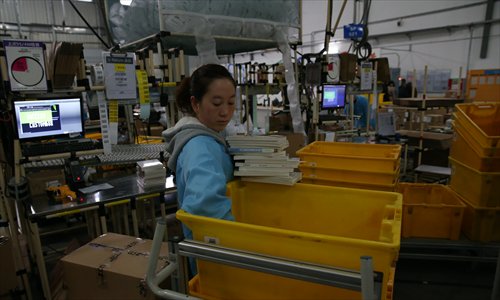Ma, Bezos join Seattle roundtable
Much at stake for Alibaba, Amazon in e-commerce

An employees sorts packages at an Amazon logistics center in Meishan, Southwest China's Sichuan Province. Amazon has about a 1 percent share in China's online business-to-consumer market in the second quarter and ranks eighth among all e-commerce platforms in China. Alibaba Group Holding's Tmall and JD.com Inc took the top two spots, with shares of 55.6 percent and 25.2 percent, respectively, according to iResearch. Photo: IC
Amazon.com Inc's Jeff Bezos and Alibaba Group Holding's Jack Ma Yun are scheduled to take part in Wednesday's US-China business roundtable in Seattle, a highlight of the itinerary featuring 30 business leaders during Chinese President Xi Jinping's State visit to the US this week.
Interactions between the global e-commerce giants at the forum will definitely catch the world's attention. Although Amazon and Alibaba are not technically targeting the same market segments, they are increasingly operating in overlapping areas.
Seattle-based Amazon, which marked its 20th anniversary in July, has recently taken new, aggressive steps in China that focus on Amazon China's Global Store, also known as AGS, to tap the vast potential of the e-commerce market in the Chinese mainland.
The move comes as the Chinese government beefs up its support for its booming cross-border e-commerce industry. The government has unveiled an action plan for the "Internet Plus" initiative, in a bid to shift its economy from manufacturing to consumer spending.
Policy support includes customs streamlining, tax breaks and payment solutions, as well as allowing full foreign ownership in "online data process and e-business transaction" enterprises.
"The market is changing fast, not only in China. We are dynamic and quick to change our focus. There are very strong e-commerce companies in China. So we are looking into what we can offer that other players cannot," Diego Piacentini, senior vice president of Amazon, told the Global Times.
Piacentini was referring to Amazon China's international brand strategy, which includes direct imports, the Amazon Global Store, a unique destination that offers more than 3 million international products with the same prices as on amazon.com, and the newly launched free trade zone model in its Global Store, which aims to give Chinese consumers a cross-border e-commerce platform to purchase foreign-branded merchandise worldwide.
Product authenticity is another strength for Amazon, an executive of the company said. "China is an exciting market that always attracts local and foreign competitors. We have a global vendor management team and our team members in China are mostly Chinese with a good understanding of the Chinese market," Steve Frazier, vice president of Amazon, told the Global Times. "We are proud of our service, our access to vendors and the best genuine products."
Amazon said it also helps China-based sellers grow their business and build brands globally. China-based sellers' first-half sales more than doubled year-on-year.
As for Alibaba, amid mounting pressure and lawsuits involving allegedly counterfeit items sold on its Taobao stores, the company has overhauled its procedure for removing problematic listings.
It also launched Tmall Global and announced plans to invest in shipping centers in the US, in a similar attempt to give Chinese shoppers access to buy authentic foreign-branded merchandise online. Tmall does not sell goods directly to consumers, which requires less infrastructure investment and offers potentially higher profit margins.
Although it is too early to say which business model will prevail, the boom in China's e-commerce sector will continue to attract worldwide businesses.